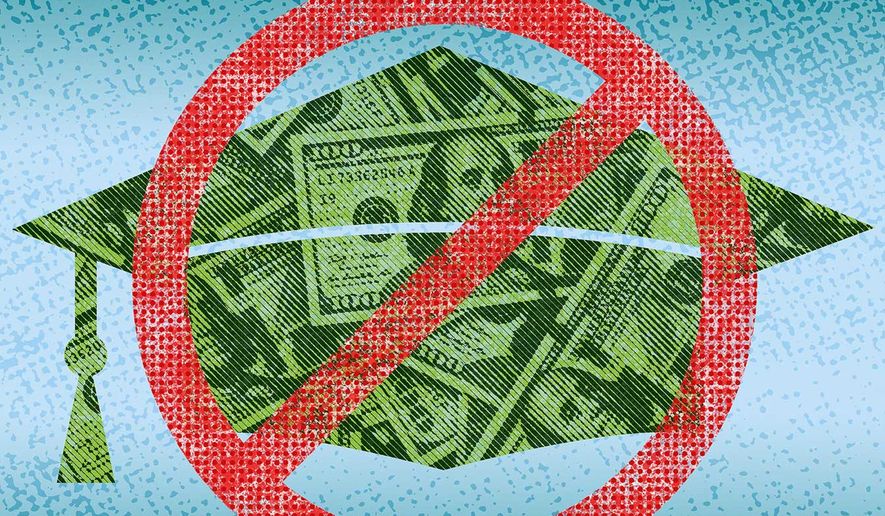OPINION:
At the peak of the pandemic, now more than two years ago, Congress (in the CARES Act) suspended payments due on student loans.
The deadline for resuming those payments — now Aug. 31 — has already been extended six times, and Team Biden seems to be wandering toward the unwise decision of having the debt — about $1.75 trillion owed by about 48 million people — paid by the taxpayers rather than the students who incurred and benefitted from the loans.
This is an important issue for Team Biden, and it would be an alarmingly easy giveaway to the progressives and their allies in academia. One of the first things Rep. Alexandria Ocasio-Cortez, New York Democrat, did after the election in November 2020 was send her spokesperson (Sen. Charles Schumer, New York Democrat) out to the microphones to demand that President-elect Biden, through executive order, immediately discharge $50,000 of student loan debt for each person who incurred such debt.
That’s a terrible idea, and so far, President Biden has resisted it.
To give you some idea of how much $1.75 trillion is, Americans owe about $860 billion in credit card debt, which is tiny compared to the $10 trillion or so in mortgage debt that Americans currently hold.
A little less than half of students have gone into some kind of debt to pay for college. While the median debt is about $19,000, about 7% owe more than $100,000; most of those incurred debt for graduate and professional school (think law or medical school), where the median debt is more than $45,000.
The federal student loan program is, at its very core, regressive and inequitable. A little more than one-third of Americans have a college degree, which means almost two-thirds don’t. Those two-thirds already pay federal taxes that support federal student loan programs.
While the Congressional Budget Office has projected that the loan programs will cost taxpayers $31 billion for new loans issued over the next decades, a more accurate calculation of what borrowers get from taxpayers — through subsidized loan rates — is more like $300 billion.
For contextual purposes, over the course of a career, it is estimated that a worker with a bachelor’s degree earns about $1.2 million more than one without such a degree.
So, those who will make less money over the course of a career pay for the choices of those who will make more. That’s the very definition of regressivity and inequity. Shifting the burden of paying back the loans to those who did not incur them and did not benefit from them will make the student loan racket even more regressive and inequitable.
The Brookings Institution — hardly a bastion of right-wing thought — has noted that most of the benefits from a loan forgiveness program would go to households in the top 40% of annual income because they have incurred most of the loans. The bottom 60% of households would receive only a third of the benefit.
Perhaps most disturbingly, reassigning the repayment of federal loans is fundamentally unfair and inequitable to those who did and are doing the right thing and either paid off or are paying off their loans. It takes, on average, a little more than 20 years for people to pay off their debt, and about 20 million Americans have paid off their loans in the last 10 years.
What should we say to those people? Thank you for working diligently for 20 years and honorably discharging your debts; if you had timed it just a little bit better, you could have gotten some of that free cash Mr. Biden is about to hand out?
What kind of moral hazard do we create for the next group who is thinking about taking out a loan? Should they assume that at some point some or all of their debt will simply vanish? Is that a wise and prudent way to proceed?
Finally, what do we say to those who decided to forego their academic dreams because they chose not to incur student loan debt for financial, family or other reasons? Tough luck? Your timing is terrible? Maybe next time?
How is any of that fair?
Mr. Biden has already been on all sides of this issue, so it is difficult to tell where he will ultimately land. But simply waving away an individual’s obligation to discharge his or her debts, especially when that is regressive and punitive to so many other people, is wrong and will have lasting and damaging consequences.
It will, incidentally, create a political firestorm as those who have paid off their debts, those who did not attend college, and those who performed military or other services to pay for college — about 280 million people in total — will be directly penalized.
We know that Mr. Biden is hearing it from the professional student class and, more importantly, from the adjunct wing of the Democratic party that resides in the academy. We encourage him to hear the other voices — the ones who did not incur the debt, the ones who have paid it off and the millions of taxpayers who are unlikely to understand why they have to pay so the children of the relatively well-off can become better-off without having to pay for it.




Please read our comment policy before commenting.